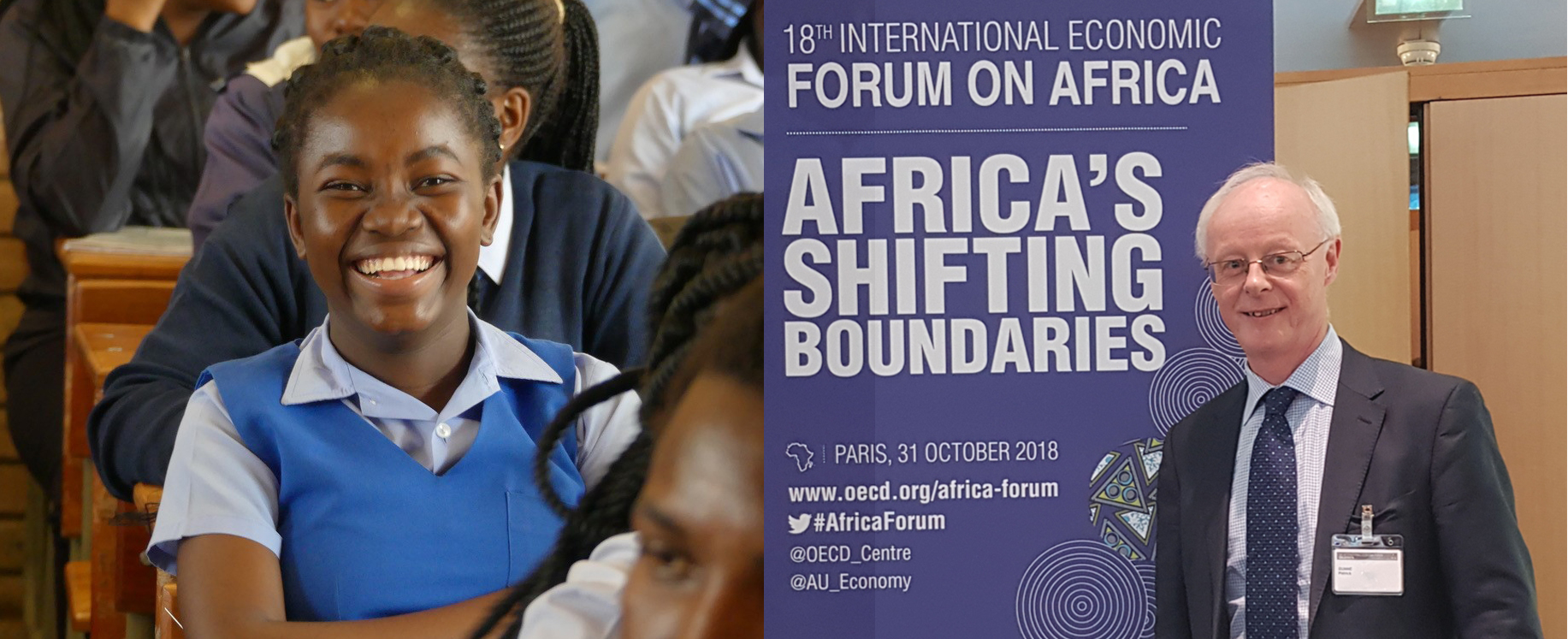“A more balanced conversation” OECD Africa Forum
By: Patrick Dunne, Board Chair, Education Sub Saharan Africa (ESSA)
“A more balanced conversation” OECD Africa Forum

Attending this year’s OECD Africa Forum in Paris was fascinating. “Africa’s Shifting Boundaries” was the theme and there were over 900 delegates from all over the world.
Angel Gurria, OECD’S Secretary General, Victor Harrison, the Commissioner for Economic Affairs at the African Union and Ghana’s President, Nana Addo Dankwa Akufo-Addo got things off to a rousing start
Gurria was uplifting, optimistic and realistic highlighting Africa’s economic growth and its drivers, population growth, urbanisation and a tripling of trade with the rest of world. In his view, recent free trade agreements on the continent, will provide a further stimulus. Yet at the same time, with 395 million Africans still affected by poverty and a further 282 million vulnerably employed and youth and women affected most, challenges persist. Some 42% of Africa's working youth live on less than $1.90 day.
Inclusive growth that creates quality jobs, high quality infrastructure and good data to make good decisions was never more important according to Gurria. Having spent a fair bit of the summer in Africa’s slums and rural schools I wholeheartedly agree. Too many people are needlessly missing out on today’s development and although poverty percentages are due to fall, absolute numbers continue to rise. If, you are interested in more stats and analysis on all of this, the recently published and very accessible “Africa’s Development Dynamics – Growth, jobs and inequalities” is well worth a look. (www.oecd.library.org)
Victor Harrison, Commissioner for Economic Affairs for the African Union, was more sanguine remarking that growth is fragile and highlighted that Africa still represented less than 1% of global manufacturing exports. He reinforced what was obviously a key message for the day which was that to seize the opportunity of consumer growth Africa needs to make more of itself.
Personally, I think that without greater emphasis and investment on engineering and manufacturing related sciences in Africa’s Tertiary Education sector this is unlikely to happen. Leadership and management skills will also be required in abundance. Reasons why ESSA’s work on the demographics of faculty and our scholarship impact hub is so important.
President of Ghana, Nana Addo Dankwa Akufo-Addo’s message was deftly delivered: “There are tremendous opportunities for shared prosperity and shifting the balance between exporting raw materials and importing manufacturing goods to a more even relationship is a priority”. From his perspective the fundamental responsibility for achieving this change and in the process creating globally competitive African organisations, rests with Africans but, given the mutual interest of the rest of the world, there was a role for others to help.
He called for an Africa/OECD relationship based on co-operating in investments in trade. After all Africa is rich in natural resources. The continent ranks 1st or 2nd in reserves of so many important resources. Yet exports are still mostly in raw form. Africa has an abundance of land but crazily is still a net importer of food. By 2050 Africa’s youthful labour force is forecast to represent a quarter of the world’s working population, bigger than China and India‘s combined and a third of the world’s youth population will be in Africa. Africa today is a $446bn market for imported goods for the rest of the world and growing.
In closing he called for four things from OECD members:
- Focus support on growth enhancing interventions and Infrastructure and Skills Development for Youth in particular.
- Simplify your processes. They are too frustrating and mean that many turn to other sources. Get Africans involved in changing them.
- Establish joint OECD/African technical committee on infrastructure.
- Build strategic partnerships based on strategic opportunities. The German Africa compact being a good example.
The rest of the day was packed with sessions on Africa’s Development Dynamics, the joys and challenges of regional integration, a glimpse into some of the issues around Africa’s development statistics, bridging the technology and knowledge gaps, the relationship between migration and development and Africa’s contribution beyond economics to the rest of the world ending up with a unifying session on “Engineering unity”
The migration myth busting facts are especially interesting. The majority, some 53%, of African migration, takes place within the continent and 70% of that is within region. Africa is also only 4th in the league of continents in terms of international migration well behind Asia, and Europe. As ever it is the secondary stats that often prove the most interesting and when you look at the share in relation to population Africa is also lower than many popularly held views would have us believe at 2.5% (including the 4.8% North Africa rate). Well below the 3.4% rate for the rest of world. Remittances from diaspora are also useful for development. Small example, remittances from Rwanda diaspora are greater than coffee and tea exports.
However, with Africa’s population growth due to outstrip everywhere else migration anxieties are more about the future than today. People tend not to move if they “believe” their prospects and those of their families will be better at home, so political stability and economic development will be critical. Average growth rates for the continent mean nothing if you aren’t experiencing it in your village.
What was the big takeaway?
The African speakers showed a smart balance of confidence and responsibility at the same time as being savvy about how to unlock further support. It was also good to hear about some of the implementation challenges and the practicalities of turning jaw dropping projections into better lives. This always needs more emphasis.
So, my big takeaway was “a more balanced conversation” and it was nice to see that unlike many other gatherings the two radios were tuned in to the same channel!